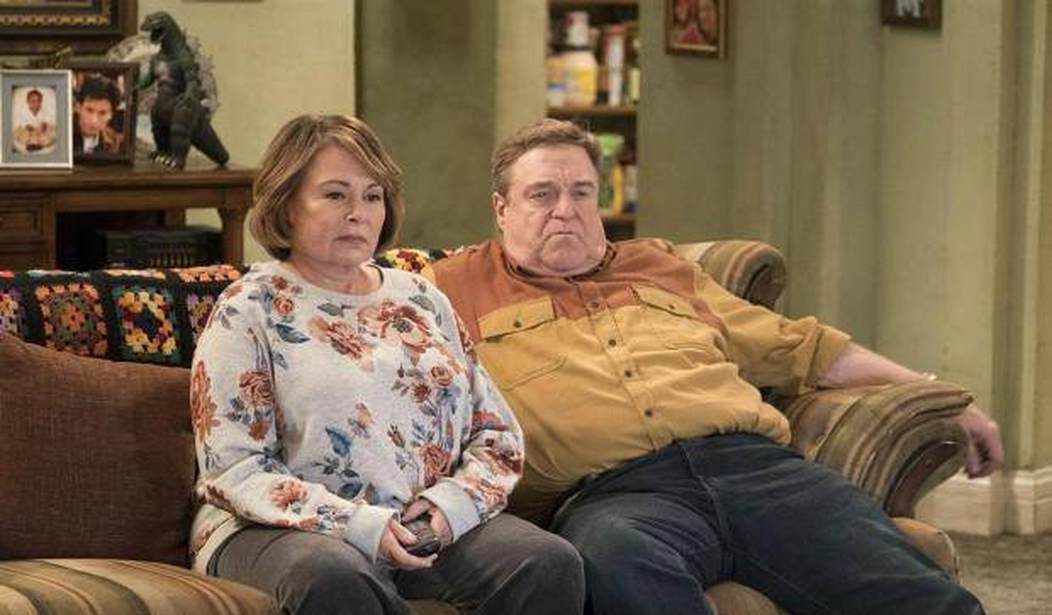The revival of the classic ’90s sitcom Rosanne has become the new Rorschach test for political and cultural social media and cable news.
Some conservative commentators—and the president—are eagerly jumping on the bandwagon, giddy to have a celebrity beyond the usual suspects on their side. Someone bigger than Scott Baio.
The cultural Left is bemoaning the “normalization” of the Deplorables. The New York Times editorial board, in a line as funny as any in the show, called it “dangerous.”
And both sides are overstating the case.
Part of this is because of the canny PR rollout of Roseanne. The comedienne herself has been running around defending Trump while promoting the show, lifting the expectations and profile of the umpteenth remake, reboot or comeback, in an industry that is addicted to them.
Some commentators, mostly liberal or mainstream, have just dismissed this with the comment that “people just like to see people like them on TV.” But The Middle has been on ABC for nine years and is a modest hit, so there’s got to be more to it than people starving to see a family struggling to pay its bills. (In fact, I watched an episode of The Middle, which I generally enjoy, immediately after watching an episode of Roseanne and it seemed slight and silly.) Also, Young Sheldon is also about a middle-class family that “can’t afford cable.” Both are hits, but neither is a phenomenon like Roseanne.
It’s also worth noting that the cultural divide extends to the audience. Nobody on the coasts watched it, but it scored a huge audience in flyover country—enough to make it the number one show.
Like the show in its good years, Roseanne is a sitcom about a lower-middle-class family coping with the modern world. A (so far) good view of the kind of people who voted for Bill Clinton, but responded to Trump for lots of reasons. They have a kid in the military, one who has moved back home with a troublesome teenager, and another who can only get part-time jobs. And they need a few more pills than their retirement health plan allows.
The first episode centered around the conflict between Roseanne, a Trump supporter, and her sister Jackie, who still won’t forgive her a year later for enthusiastically supporting Tump.
There were two fairly devastating political zingers—perhaps the best is Roseanne’s characterization of a liberal being a compassionate person “who can’t do math” in the context of Obamacare. The other being that her sister’s real beef with Roseanne is that all of the political harangues she heard during election season made her so hesitant about Hillary that she voted for Jill Stein. Now she feels guilty.
But here’s what matters: Roseanne is good; it’s very good. It’s a logical update of the original characters with the same tone as the peak years of the series. And Roseanne Barr was smart enough to bring back some writers and producers who were associated with the best years of the show (which ran at least two seasons too long).
It’s not primarily a political show, and it’s not conservative. It’s also not anti-conservative, which we consider the same thing in this hostile culture. But it ain’t Last Man Standing. It’s closer to King of the Hill (especially the Dan Connor character) but so far takes fewer potshots at specific liberal sacred cows.
It’s also an insult to compare Roseanne to All in the Family, which was ultra-lib Norman Lear’s idea of a conservative—an actual bigot, who was more bark than bite, but a bigot nonetheless. But we were supposed to sort of forgive Archie because he was old, and his type was dying off anyway. So now, the passage of time has given us a forgiving attitude toward a “classic” show. The Connor family is old school, but they’re not bigots.
The John Goodman character in Roseanne, again, is really good. He’s a guy’s guy and there are things that drive him nuts—his daughter contemplating surrogacy for the money, or his grandson wearing girls’ clothes. The difference between this show and most is that it’s okay that it bugs him.
And before you invest too much emotion in Roseanne Barr, much less the show, let’s remember, she is no Tim Allen or Mike Judge. She’s a nut. She may have her finger on a certain pulse and be right more often than a stopped clock, but this is the same woman whose National Anthem rendition would probably offend Colin Kaepernick, who has participated in ACORN and Occupy Wall Street rallies, and who proclaimed Obama the savior from the evil George W. Bush.
The best sign that Roseanne is really back is that the third episode—the one after the hyped premiere—was the best. A memorable classic, in which Dan and Roseanne deal with their daughter’s lax parenting methods and Dan buys Roseanne an automatic chair to help her get up the stairs with her bum knee. This leads to the kind of great sarcastic exchange we remember from the original, along with some priceless sight gags and physical comedy. And the final gag will leave you rolling.
That is what will keep audiences coming back and make Roseanne relevant to people in the middle—who don’t think everything in the world is about Trump. Like every other TV show, it will be good until it isn’t.









Join the conversation as a VIP Member